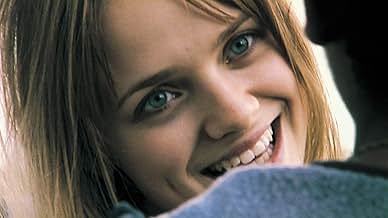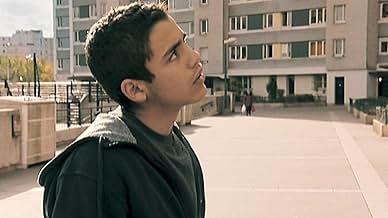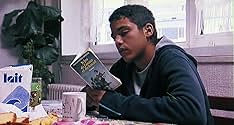L'esquive
- 2003
- 1 Std. 57 Min.
IMDb-BEWERTUNG
6,9/10
3312
IHRE BEWERTUNG
Füge eine Handlung in deiner Sprache hinzuKrimo a 15 years old shy boy falls in love for Lídia who is his classmate.To be able to assume his love for her he decides to take a part in the play that was to be one of his friends.Krimo a 15 years old shy boy falls in love for Lídia who is his classmate.To be able to assume his love for her he decides to take a part in the play that was to be one of his friends.Krimo a 15 years old shy boy falls in love for Lídia who is his classmate.To be able to assume his love for her he decides to take a part in the play that was to be one of his friends.
- Auszeichnungen
- 16 Gewinne & 5 Nominierungen insgesamt
Meriem Serbah
- Krimo's Mother
- (as Meryem Serbah)
Empfohlene Bewertungen
"Games of Love and Chance (L'Esquive)" is an involving experiment in giving classic French comedy of errors relevance to today, in a dramatic demonstration of "Plus ça change, plus c'est la meme chose" -- the more things change, the more they stay the same.
Writer/director Abdellatif Kechiche juxtaposes the titular 18th century work by Marivaux with junior high kids in a poor, inner city Arab immigrant neighborhood, for an effect that crosses Larry Clark's "Kids" with "Mad Hot Ballroom." Like any period farce, the real relationships are dizzyingly circular: A loves B who loves C who is in disguise with D. A threatens C, B changes places with D to pursue his suit and use Marivaux like Cyrano, C can't make up her mind, friends of B and C misunderstand everyone, and the course of true love doesn't run smooth.
While marred by wincingly heavy-handed intellectualizing on class social criticism by the literature teacher who is directing the kids in the play and a deus ex machina insertion of biased cops, the frank life and death-ness of adolescent romance strongly comes through in comparison to Marivaux's mannered floweriness, even as these kids communicate amongst each other with four letter obscenities, bluntly crude slang (that may not be too well represented in the English subtitles but I'm sure French subtitlers likewise have trouble with the patois in movies such as "Four Brothers"), heart-tugging looks of longing, painfully hurt tears, and, finally in frustration, physical action.
It is not clear if "the blonde" as she is referred to in the English subtitles (played by the excellent Sara Forestier, who seems to have been the only member of the cast with some previous experience before the cameras) is also from an immigrant family or Muslim, or if she just picked up use of a couple of Muslim catch phrases in her slang as to whether Kechiche is adding another layer of social commentary. Or she could just be part of the trend in French cinema to fixate on pouty young blonde temptresses, viz. "La Petite Lili," "À Tout de Suite (Right Now)," "Lila Says (Lila dit ça)."
This film has a lot of parallels with "Lila Says (Lila dit ça)," not just about sex and social setting, though it dealt with older kids, but also how literature can be an escapist outlet yet also a threat that brings hidden emotions to the fore.
The grim mise en scene makes wonderful use of a crowded, high rise neighborhood where the kids hang out chilled because they have little privacy at home, some fathers are in jail, their loving mothers try to keep tabs on them, and cell phones are their expensive lifelines.
While the film goes on a bit too long as scenes meander, probably because it isn't clear how much has been scripted and how much the kids are very effectively improvising particulars around a basic story line, their relationships are enthralling, both the romances and the friendships. Each teen actor creates an indelible and different character.
270 years since Marivaux and the human heart hasn't changed.
Writer/director Abdellatif Kechiche juxtaposes the titular 18th century work by Marivaux with junior high kids in a poor, inner city Arab immigrant neighborhood, for an effect that crosses Larry Clark's "Kids" with "Mad Hot Ballroom." Like any period farce, the real relationships are dizzyingly circular: A loves B who loves C who is in disguise with D. A threatens C, B changes places with D to pursue his suit and use Marivaux like Cyrano, C can't make up her mind, friends of B and C misunderstand everyone, and the course of true love doesn't run smooth.
While marred by wincingly heavy-handed intellectualizing on class social criticism by the literature teacher who is directing the kids in the play and a deus ex machina insertion of biased cops, the frank life and death-ness of adolescent romance strongly comes through in comparison to Marivaux's mannered floweriness, even as these kids communicate amongst each other with four letter obscenities, bluntly crude slang (that may not be too well represented in the English subtitles but I'm sure French subtitlers likewise have trouble with the patois in movies such as "Four Brothers"), heart-tugging looks of longing, painfully hurt tears, and, finally in frustration, physical action.
It is not clear if "the blonde" as she is referred to in the English subtitles (played by the excellent Sara Forestier, who seems to have been the only member of the cast with some previous experience before the cameras) is also from an immigrant family or Muslim, or if she just picked up use of a couple of Muslim catch phrases in her slang as to whether Kechiche is adding another layer of social commentary. Or she could just be part of the trend in French cinema to fixate on pouty young blonde temptresses, viz. "La Petite Lili," "À Tout de Suite (Right Now)," "Lila Says (Lila dit ça)."
This film has a lot of parallels with "Lila Says (Lila dit ça)," not just about sex and social setting, though it dealt with older kids, but also how literature can be an escapist outlet yet also a threat that brings hidden emotions to the fore.
The grim mise en scene makes wonderful use of a crowded, high rise neighborhood where the kids hang out chilled because they have little privacy at home, some fathers are in jail, their loving mothers try to keep tabs on them, and cell phones are their expensive lifelines.
While the film goes on a bit too long as scenes meander, probably because it isn't clear how much has been scripted and how much the kids are very effectively improvising particulars around a basic story line, their relationships are enthralling, both the romances and the friendships. Each teen actor creates an indelible and different character.
270 years since Marivaux and the human heart hasn't changed.
10fedka2
This is a dream film, of which I am so entirely thrilled that it received so many awards over the mediocre but over hyped Rois et reine. The self effacement of the director in this film is impeccable, one has the eerie sense of watching a Fred Wiseman documentary. It is true that dialogue can run long and circuitously, but for those with my taste for extreme realism this can only be a downside if the acting is poor, and in l'esquive it is not. The acting is on the contrary frighteningly good, whatever self consciousness the members of this young cast might have before the camera is immediately absorbed in the documentary-like mise en scene, that is to say, it only furthers the sensibilities and aesthetic as a whole. L'esquive is a singular film that we can only hope will influence a generation of young French filmmakers who are tired of the well lit, over produced cinema this country is getting far too comfortable with.
I saw L'Esquive at the San Francisco Film Festival on April 24. I was prepared for a sappy coming-of-age romantic movie but with the first dialogue which whisks you up before even the titles are shown and doesn't put you down until the end of the movie, I got something much more fulfilling. This is one realistic and well-performed movie. The director got some fantastic acting out of an almost 100% amateur cast. Very realistic and fast-paced. It is not a perfect movie, but it is very energetic and definitely a must-see.
Well worth seeing and probably the highlight for me at the festival. Hopefully it will screen in the US.
Well worth seeing and probably the highlight for me at the festival. Hopefully it will screen in the US.
I think this film deserve theirs Césars for a lot of reasons. The actors are excellent, especially Sara Forestier who's not from suburbs and has learned all words of this 'particular' vocabulary. The screenplay is very well, finally that's a play in a play ("le Jeu De l'Amour Et Du Hasard" written by Marivaux). This film shows almost the reality, is sometimes funny. The french teacher is disgusting, she is exactly what the director wants to fight : a society were there is no hope for an inhabitant of suburbs. As to her, Kremo is an idiot because he will never be Arlequin, he 'll never be in love and he doesn't even know how to play it. The film shows how wrong it is... The low point of the film is the sound, very bad, I think they wanted to be more realistic but that could be better, and realistic. This film is well to see, everyone can learn something.Even for french the language is hard to understand(sometimes we would have wanted subtitles!). I don't think the foreigners (particularly the ones who watch only blockbusters) will enjoy, or/and understand. But this freshly film is worth to be seen with attention.
The life of a band of teenager in a suburb near Paris. But instead of showing what would be the "urban legend" of this kind of poor suburb (violence, rapes...), Abdelatif Kechiche shows us what's the daily life of those guys: not much to do, not much dreams. Still, some of them have fun rehearsing for a play. Among those "players", Lydia, long time friend of Krimo... And Krimo, a bit shy, finds himself in love with this joyful girl. The good thing in this movie is that it shows the suburb as it can be : not really fun but not the awful thing we think it is. No, they're not all juvenile delinquents. Their lives are just no fun. And yes, they don't speak like Moliere did, yes they use F words. It's the way they talk to each other. But when talking to adults, they're just very polite. And even if there's no much suspense in this movie (it's just about wondering if Krimo will go out with Lydia), L'Esquive shows another suburb. A suburb where teenagers (all french, but from different origins, from Spain to Asia) are not dangerous people.
Wusstest du schon
- WissenswertesThe movie is dedicated Slaheddine.
- VerbindungenReferenced in Masterclass mit: Arnaud Desplechin et Mathieu Amalric (2019)
- SoundtracksWarini Werak Tergoud
Performed by Cheba Zahouania
Written and Composed by Cheikha Rimitti
Production: MLP / History
Top-Auswahl
Melde dich zum Bewerten an und greife auf die Watchlist für personalisierte Empfehlungen zu.
- How long is Games of Love and Chance?Powered by Alexa
Details
- Erscheinungsdatum
- Herkunftsland
- Sprache
- Auch bekannt als
- Nicht ja, nicht nein
- Drehorte
- Saint-Denis, Seine-Saint-Denis, Frankreich(Cité des Francs-Moisins: housing complex, Rue du M.al Lyautey: police control)
- Produktionsfirmen
- Weitere beteiligte Unternehmen bei IMDbPro anzeigen
Box Office
- Bruttoertrag in den USA und Kanada
- 8.085 $
- Eröffnungswochenende in den USA und in Kanada
- 2.529 $
- 4. Sept. 2005
- Weltweiter Bruttoertrag
- 1.747.263 $
- Laufzeit1 Stunde 57 Minuten
- Farbe
- Sound-Mix
- Seitenverhältnis
- 1.85 : 1
Zu dieser Seite beitragen
Bearbeitung vorschlagen oder fehlenden Inhalt hinzufügen























